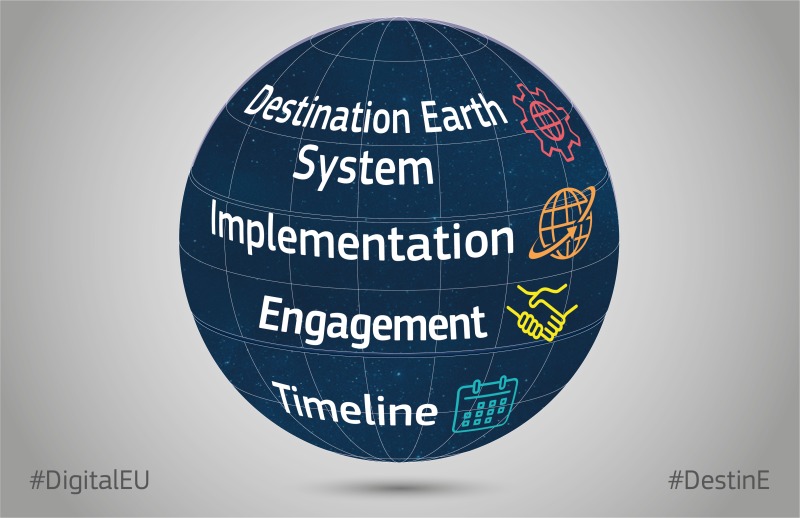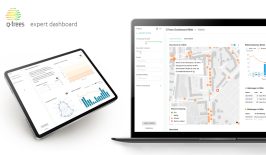As the impacts of climate change become increasingly evident, the need for comprehensive strategies to understand, predict and mitigate its effects has never been more urgent. “Destination Earth” is beginning to emerge as a pioneering initiative, utilising cutting-edge technology to forecast climate change effects and analyse human interactions with the environment.
Understanding climate change is complex
But, simply, climate change affects ecosystems, weather patterns and human and animal societies around the world. Rising temperatures, extreme weather events and sea-level rise are just a few manifestations of this complex and increasingly serious phenomenon. To effectively address these challenges, a deeper understanding of the intricacies of climate change is essential.
Destination Earth is a collaborative project that leverages advanced Earth system models, artificial intelligence, and big data analytics to simulate and predict climate change impacts with unprecedented accuracy. An initiative by the European Commission and developed by a consortium of scientists, researchers and tech experts, the initiative aims to provide policymakers, scientists, and the public with valuable insights into the future of our planet. Think of it as a state-of-the-art digital twin of the earth.
What is a Digital Twin?
The “digital twin” is an exact digital representation of a real product or process and reflects the state of its physical counterpart at any point in time. To do this, the AI-based technology requires real-time data about the nature of the object being mapped itself and about its complex interactions with the environment.
This data then provides for ongoing adaptation of the imaged object.
In addition, the digital image is fed with historical data. This enables specific monitoring and the ability to simulate different scenarios in order to optimise real products or processes.
One of the key features of Destination Earth is its state-of-the-art predictive modelling capabilities. By assimilating vast amounts of climate data, the platform generates simulations that forecast potential climate scenarios. This allows scientists to anticipate changes in temperature, precipitation patterns and extreme events, enabling proactive measures to adapt to and mitigate these changes.
The implementation of the core service platform, data lake, and initial digital twins for the DestinE project will be facilitated by the backing of the Commission’s Digital Europe Programme. Horizon Europe will contribute to the project’s advancement by offering research and innovation opportunities. Additionally, synergies exist with other significant EU initiatives, including the EuroHPC Joint Undertaking and the Space Programme, along with aligned efforts at the national level.
Human interaction and climate resilience
Destination Earth goes beyond predicting climate changes; it also examines the intricate relationship between human activities and environmental shifts. By analysing data on land use, urbanisation, deforestation and industrial activities, the platform provides a holistic view of how human actions contribute to climate change. This insight is crucial for developing strategies that promote sustainable development and enhance climate resilience.
Of course, climate change is a global challenge that requires international cooperation. Destination Earth fosters collaboration among scientists, policymakers, and communities worldwide. By creating a platform for the exchange of knowledge and expertise, the initiative empowers nations to work together in addressing climate-related issues and building a more sustainable future.
Empowering decision-makers with actionable information is one of the platform’s primary goals. Policymakers can use the platform’s predictions to formulate evidence-based policies that address the specific climate challenges faced by their regions. This data-driven approach has the potential to therefore enhance the effectiveness of climate adaptation and mitigation strategies on both local and global scales.
However, while Destination Earth represents a significant advancement in climate modelling and prediction, like any complex initiative, it is not without its limitations. For one, the accuracy of Destination Earth’s predictions heavily relies on the quality and quantity of data input. In some regions, particularly the Global South, data may be scarce or less reliable, potentially leading to less accurate climate simulations.
Another potential issue is that Destination Earth’s analysis of human interaction assumes certain behavioural patterns and policy decisions. These assumptions may not always align with real-world developments, leading to potential discrepancies between predicted and observed outcomes. Ultimately, this makes the tool less useful to those who use them as the data received is less trustworthy.
However, with all things considered, Destination Earth offers a sophisticated tool to assist policy-makers, those who have the most power to take action, in navigating the complexities of climate change. By combining predictive modelling with insights into human interactions with the environment, this initiative provides a generally comprehensive understanding of our planet’s future. As we face unprecedented environmental challenges, Destination Earth and tools like it could well be useful in guiding us towards a more sustainable and resilient future.









